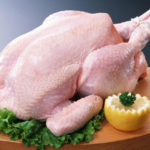Seasonal flu is an acute respiratory infection caused by influenza viruses, according to Dr. Huynh Tan Vu, Head of the Day Treatment Unit at Ho Chi Minh City University of Medicine and Pharmacy Hospital, Campus 3. Flu is typically a benign illness, and most people recover without any complications or the need for hospitalization. In rare cases, antiviral medications may be prescribed, while others can be treated symptomatically at home with certain easily accessible herbs and spices that can aid in a speedier recovery.
Basil, with its slightly sweet and spicy flavor, is a popular herb that can help alleviate flu symptoms such as coughing and colds.
Garlic possesses anti-inflammatory, antifungal, and antiviral properties. It is also an effective immune-boosting herb that can prevent flu symptoms. Allicin, a sulfur compound found in garlic, exhibits strong antibacterial and anti-inflammatory effects, making it an excellent food choice for treating the flu and reducing congestion and coughing.
Ginger, with its spicy and warming properties, induces sweating, making it effective for reducing fever and soothing a sore throat.
Lemongrass has antibacterial properties and contains anti-inflammatory compounds, citral, and geraniol, which help alleviate coughing and soothe throat pain.
Pepper, with its spicy and very hot nature, is useful for expelling phlegm, treating sudden abdominal pain, cold hands and feet, vomiting, cholera, asthma, disinfection, and detoxification. Pepper is used to treat colds, inducing sweating to eliminate external cold while warming the stomach and increasing internal warmth.
Cinnamon has a spicy and warming flavor. It disperses wind-cold, promotes blood circulation, and expels toxic external pathogens. Cinnamon is used to treat headaches, body aches, and joint and muscle pain associated with the flu. It also improves blood circulation, warms the body, and aids in digestion when added to dishes.
Fennel contains essential oils and exhibits antispasmodic, expectorant, antiseptic, diuretic, and anti-inflammatory properties, as well as antiseptic qualities, which help soothe a sore throat.
Honey is also considered an antibacterial food, effectively boosting the immune system. Drinking honey tea with ginger or fresh lemon juice and honey can help soothe a sore throat and reduce coughing.
Additionally, European herbs such as mint, rosemary, and thyme are rich in essential oils and offer excellent flu-fighting benefits.

Ginger root. Photo: Freepik
According to Dr. Vu, these herbs and spices can be used to prepare dishes as usual or brewed into tea (using fresh or dried ingredients). Infuse them with boiling water, and consume this tea 2-3 times a day, drinking it hot in small quantities. Alternatively, you can use these ingredients for facial steaming or a full-body steam bath, inhaling the hot vapors containing essential oils to clear your respiratory tract and relax.
However, individuals with hypertension should exercise caution when using spicy and hot spices (pepper, ginger, cinnamon, and fennel) as they may elevate blood pressure. It is advisable to use smaller amounts less frequently in cooking and opt for topical applications, such as steam baths. Those with underlying medical conditions should consult their specialist for dietary advice.
Additionally, individuals with the flu should seek medical attention if they experience complications beyond typical flu symptoms, such as pneumonia, middle ear infections, or injuries elsewhere. Severe flu complications include encephalitis, damage to other organs, and hematological disorders with thrombocytopenia and bleeding…
Young children under two years of age, the elderly over 65, patients with chronic illnesses (chronic lung disease, chronic asthma, chronic obstructive pulmonary disease), diabetics, and those with liver, kidney, or heart conditions, pregnant women, and individuals with weakened immune systems are at high risk for flu complications and require close monitoring. According to Dr. Vu, flu-related deaths primarily occur in these high-risk individuals, but they can also happen to healthy individuals if the flu is not properly cared for and treated.
Thu Anh
Analyzing Distinctions Between Covid-19 and Seasonal Flu Respiratory Illnesses
Have you been feeling under the weather lately? It might be difficult to tell whether it’s Covid-19 or flu symptoms you are experiencing. Fortunately, there are a few identifying factors that can help us differentiate between these illnesses. In this article, we’ll discuss the key differences between Covid-19 and seasonal flu.







































